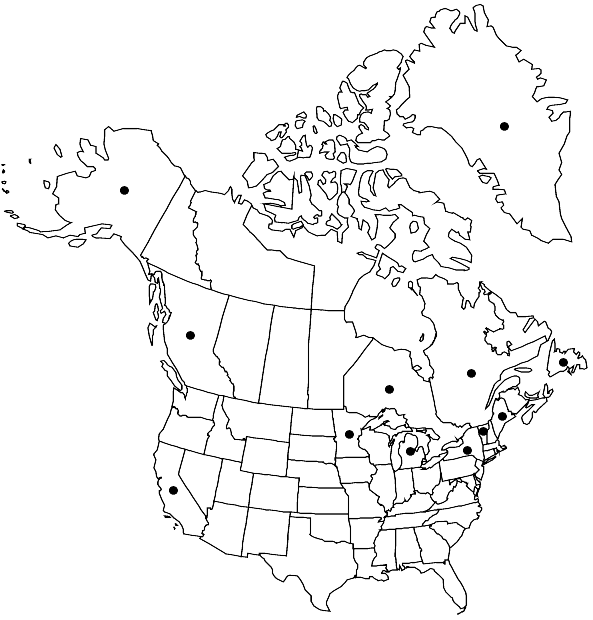Difference between revisions of "Grimmia unicolor"
in R. K. Greville, Scott. Crypt. Fl. 3: plate 123. 1824,.
FNA>Volume Importer |
FNA>Volume Importer |
||
| Line 44: | Line 44: | ||
|publication year= | |publication year= | ||
|special status= | |special status= | ||
| − | |source xml=https://jpend@bitbucket.org/aafc-mbb/fna-data-curation.git/src/ | + | |source xml=https://jpend@bitbucket.org/aafc-mbb/fna-data-curation.git/src/f6b125a955440c0872999024f038d74684f65921/coarse_grained_fna_xml/V27/V27_332.xml |
|subfamily=Grimmiaceae subfam. Grimmioideae | |subfamily=Grimmiaceae subfam. Grimmioideae | ||
|genus=Grimmia | |genus=Grimmia | ||
Revision as of 19:39, 24 September 2019
Plants in dense to loose patches, pale green to red-brown. Stems 1.5–4(–5) cm. Leaves narrowly oblong-lanceolate to ligulate from an ovate base, 1.5–2.5 × 0.5–0.7 mm, both margins incurved, intermarginal bands absent, often sheathing, muticous, cucullate, obtuse-rounded, costa narrow proximally; basal juxtacostal laminal cells short-rectangular, straight, thick lateral walled, pale yellow; basal marginal laminal cells short-rectangular, straight, thick lateral walled, pale yellow, hyaline; medial laminal cells rounded to quadrate, straight, thick-walled; distal laminal cells 2–3-stratose, rounded, thick-walled. Perichaetial leaves enlarged. Seta straight to slightly sigmoid, 2–4 mm. Capsule occasionally present, exserted, brown, oblong-ovoid, exothecial cells short-rectangular, thin-walled, stomata present, annulus of 2–3 rows of rectangular, thick-walled cells, operculum long-rostrate, peristome perforate and split in distal half. Calyptra mitrate.
Habitat: Cracks of wet acidic, siliceous rocks especially along streams or splash zones of lake shores
Elevation: moderate to high elevations (200-2000 m)
Distribution

Greenland, B.C., Nfld. and Labr. (Nfld.), Ont., Que., Alaska, Calif., Maine, Mich., Minn., N.Y., Vt., Eurasia, Africa (Ethiopia).
Discussion
In Canada, Grimmia unicolor is found predominantly around the Great Lakes of southern Ontario eastward into southwestern Quebec, with a disjunct site in Newfoundland. In the United States, it is also commonly found in the Great Lakes region and extending eastward into southwestern Maine. The disjunct sites in British Columbia and on the Seward Peninsula may be a Beringial link with populations in Asia, where this species is widely distributed, and in northern Europe. Grimmia unicolor is often found in the splash zone of rocky shorelines, especially cliffs, and along rivers. This habitat is rarely occupied by other species of the genus, except for G. olneyi. Grimmia unicolor is readily distinguished from other species in the subgenus by its leaf morphology. Its leaves are oblong-lanceolate to ligulate, with an obtuse, rounded apex which is muticous. Grimmia olneyi has an acute leaf apex with long awns, and its basal marginal cells are quadrate, contrasting with the rectangular cells of G. unicolor. Sporophytically, G. unicolor typically has a straight seta while that of G. olneyi is sigmoid. Grimmia unicolor has a much narrower costa proximally and lacks an awn, in marked contrast to the broad costa and robust awn of G. laevigata. The leaf shapes of these two species are distinct, with G. unicolor having a pronounced ovate base and narrow leaves tending towards being ligulate, while G. laevigata has broadly oblong-ovate leaves without a shoulder separating the distal and proximal lamina.
Selected References
None.